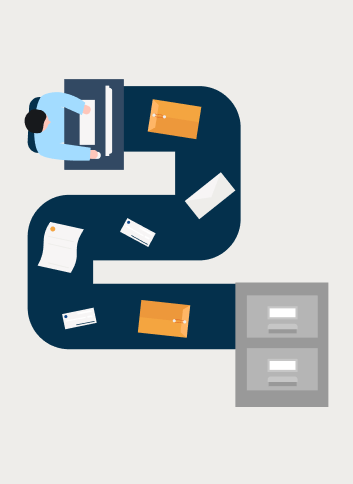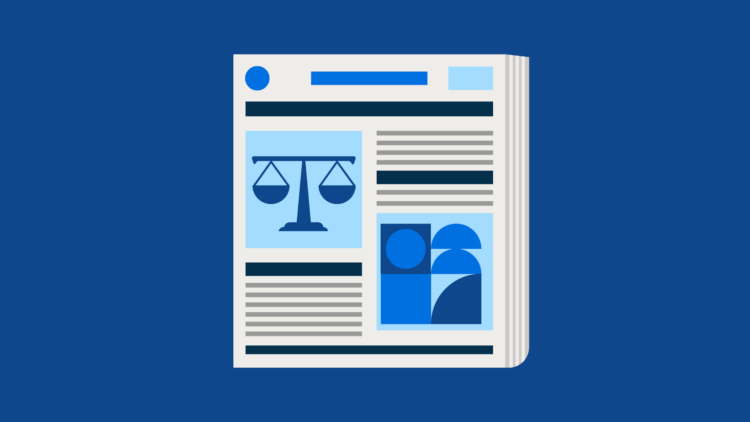With the advent of technology in the legal industry, forward-thinking trial lawyers are getting ahead and practicing more efficiently and effectively in the office, while working remotely, and even in court. With the right technology tools in your corner, missed deadlines and lost notes become a thing of the past, and you’re able to focus your mind on the engaging legal work you got into this career for—and on getting results for your clients.
Read on to learn how Clio helps you succeed at trial, by arriving efficiently prepared, showing up strong at court, closing your case, and getting paid with no loose ends left untied.
Intake new clients seamlessly
With Clio Grow, you can easily create a fast and efficient intake system. You can share public intake forms from anywhere, quickly check for duplicate clients and conflicts of interest, schedule consultations, and accept payment online. You can also customize your intake forms to ensure you’re focusing on the clients who are the best fit for you and your skill set.
Automate court form preparation
Easily remove repetitive steps and cut routine drafting in half using Clio Draft’s court forms functionality, with access to up-to-date libraries of court forms across all 50 states. You can easily generate court forms with pre-populated data from Clio Manage to reduce the risk of errors, save regularly used form sets, and even collect signatures electronically.
You may like these posts
Serve documents from anywhere
Proof is integrated directly with Clio, and more specifically, with your Clio documents and matter information, keeping data entry to a minimum for serve requests. You can create serve requests in seconds, from anywhere, track progress from anywhere, and never have to leave Clio.
Master court deadlines
Use Clio’s legal calendaring software to create events automatically based on rules and deadlines from hundreds of U.S. courts. Stay on top of filing deadlines, case milestones, court dates, and more. You can also set multiple notifications—days or minutes in advance—so you never miss a meeting or deadline.
Save time booking court reporting services

Book depositions, court reporting services, videography, interpreters, and more with Steno directly from within an individual matter in Clio Manage. You can easily access and manage services for all your upcoming depositions from within each Clio matter. And, you can intuitively view, store, manage, and download transcripts, exhibits, and other files along with the rest of your case management—all right from within the Clio platform.
Supercharge your legal research
With integrations like Fastcase and Casetext, Clio makes it easy to manage all of your legal research in one place. With Fastcase, it’s easy to track billable research time in Clio and save data back to matters. With Casetext, you can start research tailored to your litigation by sending a document from Clio to Casetext’s artificial intelligence search, CARA A.I.
Access to everything you need
During trial and other in-court appearances, Clio Manage makes it easy for trial lawyers to bring the power of your law firm into the courtroom.
- Never miss an appearance with firm-wide calendars. These also make it easy to negotiate scheduling orders far into the future.
- Internal messaging helps your firm share information about the case quickly without leaving Clio or the courtroom.
- Document access and full-text search help you find and produce documents and exhibits without having to carry bankers boxes.
- Forgot a document? Clio’s ScanSnap integration means your law office can get the document to you at the speed of light.
- Let the timer run. Clio Manage’s built-in timer can help bill your courtroom appearances to the second.
- Traveling to distant courthouses? Let Clio help you calculate mileage costs.
Do all of this and more from Clio Manage on your laptop, or from your Clio mobile app.
Never worry about a client missing their appearance

With text message reminders from Clio, it’s easy to make sure your client is aware of all upcoming trial dates.
Stay one step ahead of opposing counsel with document automation
Document templates in Clio Manage and Clio Draft mean you can quickly create orders for the judge to sign using your own precedents.
Stay on track with trial work beyond the courtroom
Trial lawyers use Clio Manage’s custom task lists to keep their team focused on preparing for each day of the trial. From anywhere, you can input daily details in support of your next day’s trial plan.
Keep your key facts, witness testimony, and evidence organized
With FactBox and Clio, it’s easy to organize all facts in your lawsuits, link facts back to their source documents, and keep firm members automatically updated in both tools so all case details stay centralized in Clio.
Collect more and get paid faster

Clio Payments makes it easy for clients to pay their bills anytime, anywhere. Easily send bills via email using Clio Manage with a link to pay via Clio Payments. Clients can also pay bills or trust requests online through your website, client portal, text message, and more. Plus, accept in-person payments with tap to pay. (Learn more about how a seamless experience for clients helps improve collections in the Legal Trends Report).
Quickly and easily create disengagement letters
Use document automation features in Clio Manage and Clio Draft to save time drafting disengagement letters once your matters are closed.
Let Clio run your firm while you win at court
While legal technology can’t guarantee a favorable outcome in court, the right tools will certainly enable you to run your processes more smoothly, reduce the risk of error, and empower you to spend more time and energy on both your legal arguments and strong client service. Forward-thinking trial lawyers who embrace tools like Clio can access a whole different experience when it comes to practicing law—one that better sets them up for success in each case and long-term in their practices.
But don’t take our word for it: Over the years, we’ve heard plenty of incredible stories from trial lawyers using Clio. For Texas Criminal Defense attorney Robert Guest, the days of lugging around paper files and notes from one court appearance to another are long gone. “Honestly, I show up to court with just a phone …. that’s all I need as a Criminal Lawyer,” he says.
That might seem like a stretch if you’ve never used technology in the courtroom before. But for those hesitant about it, Tacoma, Washington-based attorney Jordan Couch had this to say:
“I can do it with a piece of paper and a pen, and I’ve gone to court like that before. But I’m a lot more effective when I go to court with online documents. If a judge asks me a question, I can have the answer immediately instead of having to go back to my desk and say, ‘Give me a moment, your honor,’ I have the answers immediately. I’m more prepared. I’m better off, and I’m getting there faster.”
To see Clio in action, book a demo today.
We published this blog post in February 2024. Last updated: .
Categorized in: Technology
Organizational Strategies to Maximize Success at Court
Unlock courtroom success with with tips on organization, automation, and innovative tech in Clio’s upcoming CLE-eligible webinar taking place April 16, 2024 at 11:00 a.m. PT | 2:00 p.m. ET.
Watch Now








